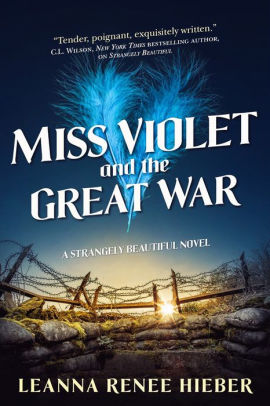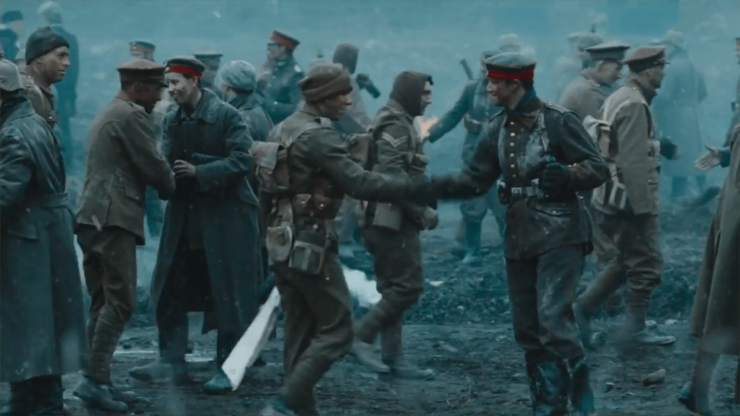On Christmas Eve, 1914, in the early months of the war that would wage years and claim millions, in France along the Western Front, legend has it that British soldiers, perhaps a bit dazed and shell-shocked, realizing it was Christmas Eve, hunkered down in their trenches and began to sing.
During a break in the shelling, it was said that the beloved Christmas carol “Silent Night” could be heard, lifting into the still air. German soldiers, recognizing a song that was hardly a century old—it was written in 1818 by Franz Xaver Gruber for voice and guitar to accommodate a broken organ in Oberndorf bei Salzburg, Austria—joined in the familiar tune. As so much of German Christmas custom had been adopted by the British thanks to Prince Albert (Christmas trees and such), the worldwide popularity of Silent Night, Stille Nacht, transcended language barriers and opened up “No Man’s Land”; the dangerous, barbed-wire-bound yards between the trenches, to a soldier-driven peace that lasted for days—in some cases, weeks.
The Christmas Truce carried down the line and men raced up and out of their trenches, fostering camaraderie in many ways. Many soldiers played games; several accounts featured lively football games played with ration tins. Others traded supplies and stories, some took the moments to recover bodies and mourn. Each part of the front ‘celebrated’ the truce a bit differently. For some it was little more than a pause in fighting. Not every part of the line was fortunate enough to enjoy the breather. Many opposed the truce, like, for example, a young Adolf Hitler.
None of the events around the Christmas Truce were an official truce, commanded or directed. All of it was organic and understandable in a case where there was no clear ‘enemy’, not when aristocratic squabbles and power-plays lay at the heart of it all; Queen Victoria’s grandchildren all fighting over scraps of colonialist pie the world over.
What’s always been so striking to me is how the news of the communal truce traveled back to the home fronts, how artists captured pictures of it for newspapers, how it became burned into the consciousness of how the war has been remembered. The truce was an instance of true and expansive shared humanity in the face of a heartless war over where millions died simply trying to gain a few feet of muddy, bloody ground. The truce captured the world’s heart because, I believe, in the end, the world wanted to see people coming together who had been pitted as enemies and considered little more than expendable cannon fodder by forces beyond their direct control.
The Christmas Truce became famed in each language of the trenches: Weihnachtsfrieden; Trêve de Noël.
The event is the cornerstone of my own take on this time period. It is all the more heartbreaking that the Truce was ordered to end, by the same forces beyond these soldiers’ direct control. If one didn’t resume the fighting, they could be shot as a ‘deserter’. As heartwarming as the truce was, I find it more heartbreaking that it was then so forcibly broken.
Recently, many pop culture institutions have lifted up this piece of history as we pass the centennial mark of the Treaty of Versailles that officially ended the war. The depth of heart, the genuine power of the human capacity for peace is so illuminated by this real event, it is then no wonder it’s been revisited often, whether in a very straightforward way in the film Joyeux Noël, an impactful and meaningful take on the Truce from the French perspective utilizing the transcendent magic of music as a force to stop war, or referenced in various historical fantasy venues. The Christmas Truce captures the imagination, and did right from that first Christmas; a widely reported event that was meant to be treasured and noted in the annals of history.
Wonder Woman’s trench scene in Patty Jenkins’ fantastic film managed to movingly capture the reality of trench warfare. In the long, direct trench sequence, the specific horrors of trench warfare are fully seen and felt in a detailed historical footprint. As Diana moves through the trench maze, we the audience move with her and see those harsh realities through her eyes and feel with her powerful heart. Jenkins had to fight the producers to keep that extended sequence in the film.
I’m grateful Jenkins fought that fight, as trench battles define this particular war and make for a visceral accounting. I found that scene to be by far the most impactful of the film. If there wasn’t any focus on the trenches and the realities therein then the film wouldn’t have had a strong historical timestamp. The uniquely grim truths of trench warfare then make the contrast of a soldier-driven truce, moving out and up from them towards camaraderie, all the more understandable and relatable. The horrors motivate Diana to transform from empathy to action.
A recent Doctor Who Christmas Special also dealt with the Truce directly. It’s a perfect, ready-made moment in history for the Doctor to visit (two Doctors I should say, as the first Doctor—brilliantly played by David Bradley—is also there with Capaldi in a feat of wibbly-wobbly-timey-wimey stuff). A core part of the episode allows for the truce to play out much as it did in real life, while focusing on the character of The Captain. Unfortunately, the time-stopping respite for all involved is temporary just as it was in truth. However, the truth of the truce proves one of the Doctor’s best ongoing points; humans are a species the Doctor will never give up on. Full of surprises and stubborn hope. Full of heart.
Buy the Book


Miss Violet and the Great War
The moment that the Christmas Truce represents is as timeless as the Doctor and remains a potent invitation to celebrate shared humanity. After all, Capaldi’s Doctor left us with the mandate “be kind”. It is this moment of kindness, defiant kindness even, a refusal of orders to kill, that has so captured history, film and fiction. The truce was not a reactive kindness, it was active kindness as a force and choice to be reckoned with. That remains a simple, powerful message. It’s one we could use more of, particularly from the powers that be.
The truce was a stunning example of what has now been dubbed in fiction as “hopepunk”. That defiant, vibrant, power-upending hope is what captured me about this event and what I try to embody in my novel, Miss Violet and the Great War.
My final drafts of Miss Violet and the Great War were already written when I saw these takes on the war and the truce so while those weren’t an influence on what I’d already written, needless to say, I wept during each sequence, as every take on this true story has a different nuance and each carries its own resonant emotional impact. The transcendent, ongoing power of this very real history is able to illuminate aspects of each fictional universe that speak to goodness, to the fortitude of the heart, and to setting aside differences in alternatives to bloodshed.
For those curious about some incredible WWI sources and accounts, a constant companion of mine throughout my process while writing Miss Violet and the Great War was a collection of war poems titled “Poems of the Great War: 1914-1918”, a Penguin collection of war-time poets that is devastatingly beautiful and revelatory. Other resources I found helpful: Eye Deep in Hell: Trench Warfare in World War I by John Ellis, Walking Verdun: A Guide to the Battlefield by Christina Holstein, Battles of World War I by Martin Marix Evans and World War I Trench Warfare I and II by Dr. Stephen Bull for Osprey publishers.
Fröhliche Weihnachten.
Joyeux Noël.
Merry Christmas.
Leanna Renee Hieber is an actress, playwright and the author of thirteen Gothic, Gaslamp Fantasy novels for adults and teens for Tor and Kensington Books such as the Strangely Beautiful saga, the Magic Most Foul trilogy, the Eterna Files trilogy and The Spectral City series. The Strangely Beautiful series hit Barnes & Noble and Borders Bestseller lists and garnered numerous regional genre awards, with revised editions of the complete series now available from Tor, Miss Violet and the Great War being the finale. The Spectral City has been a bestseller across several genres and platforms. A four-time Prism Award winner and Daphne du Maurier Award finalist, her short fiction has appeared in numerous anthologies and her books have been translated into many languages. She tours the country with By the Light of Tiffany: A Meeting with Clara Driscoll, a one-woman theatrical presentation about the 19th century designer of Louis Comfort Tiffany’s lamps. A proud member of performer unions Actors Equity and SAG-AFTRA, she lives in New York City where she is a licensed ghost tour guide for Boroughs of the Dead and has been featured in film and television on shows like Boardwalk Empire and Mysteries at the Museum.










